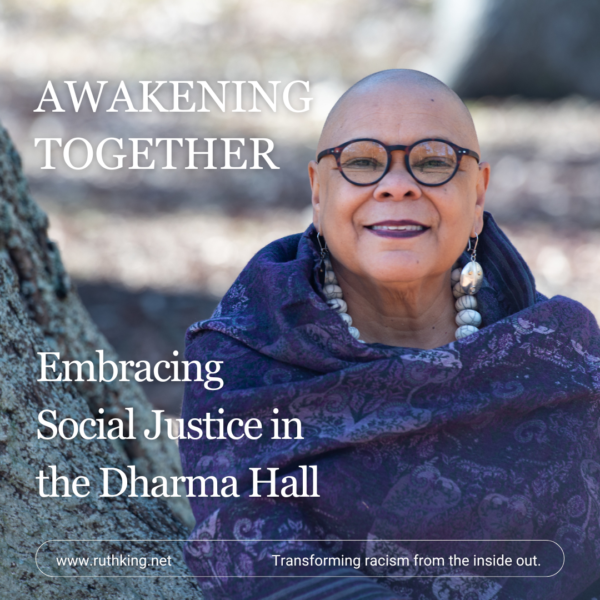As an African American lesbian elder and educator of the dharma, I am often challenged by students and teachers who feel that raising social and political issues within the dharma hall is inappropriate if not distracting from practice. I often will hear: I’m here to work on my mind, to be free from suffering. But we must ask: To what end when suffering in the world is urgent, threatening, and horrendous for so many of us. To acknowledge social injustice and systems of power is not to take sides or to invite a debate, to organize, or to solve systemic problems. It is more the naming of harm that is all around us and an invitation to wisely support practitioners in working with the stimulation and distress it creates within us and especially our response to it.
The Buddha specialized in the end of suffering and the embrace of peace. Surely there is room in our practice for acknowledgement and exploration of how we meet the complexities of our time both on and off the cushion with wise care. Relevant to this topic is John Welwood, Buddhist Psychologists, who coined the term Spiritual Bypassing in the early 80’s:
I coin the term [spiritual bypass] to describe a process I saw happening in the Buddhist community and also in myself… We often use the goal of awakening to rationalize what I call premature transcendence – trying to rise above the raw and messy side of our humanness… before we have fully faced it and made peace with it… I see this as an occupational hazard of the spiritual path. It leads to a conceptual one-sided spirituality: Ultimate truth is favored over Relative truth; emptiness over form; transcendence over embodiment; detachment over feeling.
As a spiritual leader, I generally will approach teaching in two ways: (1) offering my understanding of what the Buddha taught using my lived experience and practice as an example, and; (2) talking about my life and how the dharma supports my understanding of belonging to both the challenges and beauty experienced near and far.
I feel responsible for speaking up when my heart is pinched by social injustice and political oppression; to not collude in silence or neutralize the suffering that rains upon masses of people by down playing the heat of the obvious. My talks often and naturally include an invitation to investigate the worldly winds of social corruption and innocence, wisdom and irrationality, distance and intimacy, and receptivity and force – to examine our part in its harm and healing. Japanese Buddhist educator, poet, philosopher, and former president of Soka Gakkai International, Daisaku Ikeda, shares:
The joy of life is to be found not by evading life’s sufferings but by grappling with them to the finish. Escapism cannot produce true happiness. Happiness based on delusion does not last. Enlightenment comes from seeing the truth, no matter how unpleasant it may be.
It is not uncommon for me in a dharma talk to specifically name the social and power challenges impacting ethical and global wellbeing, for example, the systemic oppression and suffering in Gaza and Sudan, not to mention the pressing threat of political and civil uprising within the United States, and invite practitioners to examine their relationship and kinship to what leads to harm and what leads to its release. From this base of exploration and understanding flows a natural, responsible, and compassionate response to social suffering - or at least, this is my prayer.
Many Buddhist communities have called for more social understanding and engagement, most notably the work of Venerable Thich Nhat Hanh and Plum Village as well as the Buddhist Peace Fellowship. Many Black Buddhist teachers would find it hard pressed not to speak of social issues when teaching as illustrated in these top selling publications: Black & Buddhist: What Buddhism can teach us about resilience, transformation, and freedom edited by Giles & Yetunde; Black Buddhists and the Black Radical Tradition: The practice of stillness in the movement for liberation by Rima Vesely-Flad; and Joyously Just: Black Wisdom & Buddhist Insights for Liberated Living by Dr. Kamilah Majied. The recent offering by the Social Justice Coalition, an international coalition of dharma teachers, leaders, and sangha members, calling for a dharma response to Gaze, is another important resource for social practice and global wellbeing, as well as earth and climate activists Ayya Santacitta of Aloka Earth Room, and Thanissara’s seminal publication Time to Stand Up: An engaged Buddhist manifesto for our earth – The Buddha’s Life and Message from feminine eyes.
There is no limit to suffering throughout the world, nor is there a limit to our collective good will. We will all see and serve differently, hopefully with a moral compass of seeing ourselves in those we judge and taking action with an intent to not cause harm.
Wherever you see fit to serve, your wise and embodied offerings are needed. I believe that if we can stay close to the pain of social suffering; if we were, for example, to embrace that every death was our child, perhaps we could be more curious than critical, more collectively courageous and less afraid to connect to social distress and thus to a full-bodied and interdependent fact of our lives.
If I didn’t belong to you, I wouldn’t be here
If you didn’t belong to me, you wouldn’t have come
Your liberation is tied to my liberation
My liberation is tied to your liberation
and Your heart and My heart are very old friends
May all beings be free from suffering
Ruth King
Learn more:
Mindful of Race 101 - On Demand Training

